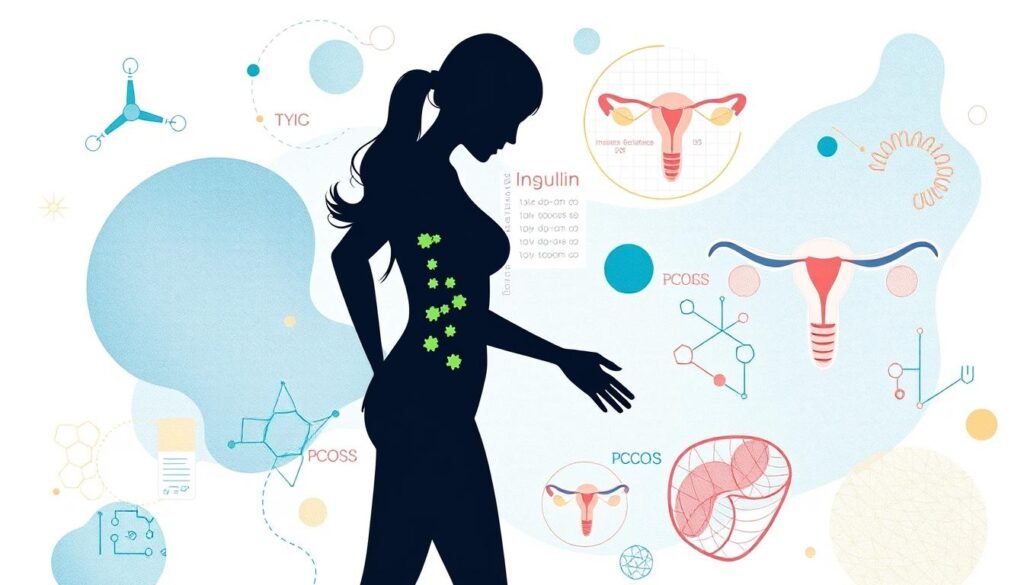Did you know over half of the people with Polycystic Ovary Syndrome (PCOS) will get type 2 diabetes by 40? This fact highlights the strong link between PCOS, insulin resistance, and diabetes. Insulin resistance plays a big role in this health issue. About 5 million individuals in the U.S. face PCOS. They deal with problems like irregular periods and possible infertility. It’s vital to understand how PCOS connects to diabetes for those affected.
Many women with PCOS have hormone imbalances. These can lead to a higher chance of insulin resistance and thus, diabetes. Women with PCOS also face more health issues. These include heart disease, high blood pressure, and diabetes during pregnancy. Knowing more about PCOS and its ties to diabetes can help in finding the right lifestyle changes and treatments.
Key Takeaways
- Over 50% of individuals with PCOS will develop type 2 diabetes by age 40.
- PCOS is prevalent in as many as 5 million women and often leads to various health issues.
- Insulin resistance is a significant risk factor for developing type 2 diabetes in women with PCOS.
- Engaging in healthy lifestyle practices can lower the risk of diabetes in PCOS patients.
- Regular monitoring and screening for diabetes complications are essential for long-term health management.
Understanding Polycystic Ovary Syndrome (PCOS)
Polycystic Ovary Syndrome is a hormonal disorder affecting 5–15% of women before menopause. It is marked by many ovarian cysts and leads to hormone imbalance. It often takes up to two years for a woman to get the right diagnosis. They usually see about four doctors first.
About 80–90% of women who miss many periods each year might have PCOS. If you have less than 8–10 periods a year, this could be why. Also, 10% of women with PCOS get Type 2 diabetes. Another 30% might face prediabetes, showing a strong link between PCOS and metabolic issues.
Being overweight increases the risk of diabetes in women with PCOS, especially if their BMI is 30 or more. But, even women who are not overweight can face this risk. African American women with PCOS often have higher chances of getting metabolic syndrome and prediabetes. This shows the varied effects of PCOS among different groups.
Genetics play a role in PCOS. Around 20 genes linked to it have been found. Research now aims to understand the genetic and hormonal differences in PCOS types. This could lead to new ways to prevent diabetes in those affected.
Insulin resistance is also key in PCOS, seen in 30% to 40% of cases. This condition can increase glucose, leading to prediabetes and Type 2 diabetes. Identifying and managing insulin resistance is critical. Managing PCOS well also involves eating right and staying active to lower risks.
Common Symptoms of PCOS
Polycystic Ovary Syndrome (PCOS) shows different symptoms in different people. Knowing these symptoms is key for early finding and treatment.
- Irregular periods: Many women have irregular menstrual cycles. Some may have longer or no periods at all.
- Hyperandrogenism: It causes too much hair growth, called hirsutism. This comes with acne and oily skin too.
- Weight gain: Being overweight is common in PCOS and can make other symptoms worse.
- Infertility: A big worry is having trouble getting pregnant, which can be very upsetting.
- Acanthosis nigricans: Dark patches of skin can show up, often where skin folds. It suggests insulin resistance.
About 5 million women in the United States have PCOS. It often goes unnoticed until infertility becomes a problem. Knowing the symptoms of PCOS helps with early help and improves health.
How PCOS Affects Women’s Health
Polycystic Ovary Syndrome (PCOS) is more than a reproductive issue. It affects 65 to 70% of women with PCOS by causing insulin resistance. This resistance can lead to serious health problems like obesity and Type 2 diabetes. A large number, 70 to 80% of obese women who have PCOS, also suffer from insulin resistance. This makes managing weight crucial for their health.
The link between PCOS and other chronic diseases means regular medical check-ups are vital. Women with PCOS have higher risks of suffering from glucose intolerance and inflammation. Also, dyslipidemia adds to their health challenges. Beyond physical issues, PCOS significantly impacts mental health. Studies indicate a higher risk of depression and anxiety among these women, affecting their happiness.
Adjusting lifestyle habits is key to managing PCOS risks. Regular exercise and a healthy diet can help reduce symptoms. Monitoring what you eat and how much you can aid women in controlling PCOS complications. Metformin, a medication, has shown promise in lowering fasting insulin levels and enhancing glucose tolerance.
| Health Concern | Impact of PCOS | Statistical Evidence |
|---|---|---|
| Type 2 Diabetes | Increased risk, particularly in those with obesity | More than half will be diagnosed by age 40 |
| Insulin Resistance | Common feature affecting 65-70% of women | 70-80% in obese cases |
| Mental Health Issues | Higher rates of anxiety and depression | More frequent among women with PCOS |
| Obesity | Significant risk factor for insulin resistance | Substantial prevalence among women with PCOS |
PCOS and Its Link to Type 2 Diabetes and Insulin Resistance
Polycystic Ovary Syndrome (PCOS) raises the risk of developing insulin resistance. This leads to challenges in how the body uses insulin. It affects women with metabolic disorders. Most women with PCOS, whether overweight or not, tend to have insulin resistance.
Understanding Insulin Resistance
High insulin levels are a key cause of PCOS symptoms. Obesity and weight gain over the years may be linked to more PCOS cases. Insulin resistance can lead to diabetes and heart problems. Early testing for this condition is crucial for those with PCOS.
The Connection Between PCOS and Type 2 Diabetes
Women with PCOS are much more likely to get Type 2 diabetes. They are 4 to 8.8 times more at risk than those without PCOS. The average age of diabetes diagnosis is younger in women with PCOS. Body weight, insulin levels, and triglycerides play a role in their diabetes risk. Lifestyle changes, metformin, and supplements like inositol can help manage insulin resistance.

Epidemiology of Diabetes in Women with PCOS
The study of diabetes in women with PCOS shows worrisome patterns. Up to 12.4% of these women may have Type 2 diabetes. This rate is much higher than that in the general population. These numbers help us see what women with PCOS deal with concerning blood sugar issues.
Prevalence of Type 2 Diabetes
Women with PCOS are four times more likely to get Type 2 diabetes. Without PCOS, the risk of diabetes could drop by 19-28%. While just 1% to 3% of women without PCOS get Type 2 diabetes, those with PCOS have a more than 50% chance by age 40.
Risk Factors for Developing Diabetes
Several factors increase the risk of diabetes, such as obesity and insulin resistance (IR). About 75% of lean PCOS women and 95% of obese ones have insulin resistance. Gestational diabetes is also 2-3 times more common in women with PCOS. This highlights the need for careful monitoring and management.
The Role of Hormonal Imbalance in PCOS
Polycystic Ovary Syndrome (PCOS) is known for a big hormonal imbalance. This includes high levels of androgens, or male hormones. Such an imbalance causes various symptoms and metabolic issues that harm a woman’s health. Hyperandrogenism leads to unwanted hair growth, severe acne, and male-pattern baldness.
PCOS leads to menstrual irregularities, like fewer or longer cycles. It complicates fertility due to many immature follicles in the ovaries that don’t release eggs properly. Obesity makes these symptoms worse and invites more severe complications. Those with obesity also encounter extra metabolic problems from the *hormonal imbalance*.
Insulin resistance is crucial in PCOS and the resulting hyperandrogenism. Increased insulin can push the ovaries to make more androgens, making the hormonal issues worse. Also, low-grade inflammation seen in people with PCOS could increase the androgen production. This raises the risk of heart and metabolic diseases later on.
Genetics might play a role in PCOS, showing a possible genetic connection. With 10-15% of women of childbearing age affected, PCOS is the leading endocrine disruption disorder among them. For a deeper look at PCOS and its effects, check out this study.

Lifestyle Modifications for Managing PCOS and Diabetes
Making lifestyle changes is key to managing PCOS and its tie to diabetes. These modifications can greatly help women and lower the risk of complications. Eating well and staying active are crucial steps.
Importance of Diet and Nutrition
Eating right is essential for controlling diabetes and helping those with PCOS feel better. Choosing whole foods, eating more fiber, and picking low glycemic foods can improve insulin use in the body. Women with PCOS should aim for 21 to 25 grams of fiber daily to fight insulin resistance.
- Incorporate whole grains like quinoa and brown rice, which provide necessary nutrients and fiber.
- Include anti-inflammatory foods, such as leafy greens, berries, and nuts, to enhance health.
- Consider fish oil supplements combined with vitamin E, shown to decrease insulin levels in women with PCOS.
Exercise and Weight Management
Exercise is vital for losing weight and managing diabetes for women with PCOS. Aiming for 120 minutes of intense exercise each week is beneficial. Even a small weight loss, like 5% of total body weight, can cut diabetes risk sharply.
Studies reveal that combined diet and exercise interventions resulted in a mean weight loss of approximately -5%, showcasing the importance of these lifestyle modifications.
Diet and exercise together enhance success chances. Women see better results with both diet changes and active living. This method helps with weight control and improves overall health, lessening diabetes risks.
Treatment Options for PCOS and Diabetes Management
Women with Polycystic Ovary Syndrome (PCOS) and a diabetes risk have many treatment options. These strategies aim to balance hormones and manage insulin sensitivity.
Medications like Metformin
Metformin is a top choice for handling PCOS and diabetes symptoms. It was first made for type 2 diabetes. It helps reduce insulin and sugar levels in blood. This is especially good for women with PCOS who are insulin resistant. Losing just 5% of weight can lessen PCOS symptoms, with Metformin’s help.
Doctors may also suggest other drugs along with Metformin. The contraceptive pill is one option to make periods regular for PCOS women. It also helps with hormone balance. Other drugs, like cyproterone acetate and spironolactone, are used to manage too much hair growth from PCOS.
Letrozole, a breast cancer drug, might be used to help start ovulation. IVF is another option for those struggling with infertility. It’s important but increases the chance of having twins or more, so think carefully.
An overview of common treatment options is outlined in the table below:
| Treatment Option | Indications | Possible Risks |
|---|---|---|
| Metformin | Improves insulin sensitivity, aids in weight loss | Nausea, diarrhea |
| Contraceptive Pill | Regulates menstrual cycles, decreases androgens | May increase blood clots risk |
| Letrozole | Stimulation of ovulation | Off-label use; monitoring needed |
| Spironolactone | Reduces excessive hair growth | Electrolyte imbalance |
| IVF | Assistance with fertility | Higher chance of multiple births |
| Laparoscopic Ovarian Drilling | For fertility not responding to medications | Surgical risks such as infection |
With a detailed treatment plan that includes Metformin, women with PCOS can see big health improvements. Always talk to health experts about what’s best for you. For more about PCOS treatments, click here.

Maintaining Long-Term Health with PCOS
Managing polycystic ovary syndrome (PCOS) is key for women’s long-term health. If you have PCOS, it’s important to keep track of your health to catch problems like diabetes early. Creating a detailed healthcare plan helps improve your life quality.
Monitoring and Screening for Complications
Getting checked for diabetes is super important for women with PCOS. This is because they are more likely to get metabolic issues. In fact, 12.4% of women with PCOS get diabetes, unlike only 1% to 3% of other women. Catching and managing this early is crucial.
Women with PCOS need a health plan that includes:
- Checking blood sugar to watch insulin levels.
- Regular tests to check body and metabolic health.
- Looking after mental health to deal with PCOS related anxiety and depression.
PCOS can also lead to issues like metabolic syndrome and heart disease, so these need watching too. A huge 67% to 85% of women with PCOS don’t have enough vitamin D. An approach covering different areas helps manage symptoms and lowers health risks.
Knowing about these health matters can help women with PCOS take control. To learn more about dealing with insulin resistance and weight, check out this link on PCOS and Insulin Resistance.
| Health Issue | Prevalence in Women with PCOS | Risk of Developing by Age 40 |
|---|---|---|
| Type 2 Diabetes | 12.4% | More than 50% |
| Heart Disease | Higher Risk | Unspecified |
| Metabolic Syndrome | Common | Unspecified |
| Vitamin D Deficiency | 67% to 85% | Unspecified |
By actively monitoring PCOS and watching out for other issues, women can greatly improve their health outcomes.
Conclusion
The link between PCOS and diabetes is very important for women to know about. Up to 20% of women might be affected by PCOS. Knowing the risk factors and symptoms is key for good health management. Early detection can make a big difference in health outcomes. This makes it very important to be proactive about both conditions.
Making changes in lifestyle can greatly help in controlling PCOS and diabetes. Eating better, exercising regularly, and taking the right medications are important steps. These changes can help with insulin resistance, reproductive health, and overall well-being. Regular check-ups are also helpful in preventing Type 2 diabetes among women with PCOS.
To learn more about PCOS and diabetes, check out this detailed article. Understanding this connection and following the right health practices can greatly improve life. It can also help avoid problems related to PCOS and diabetes.